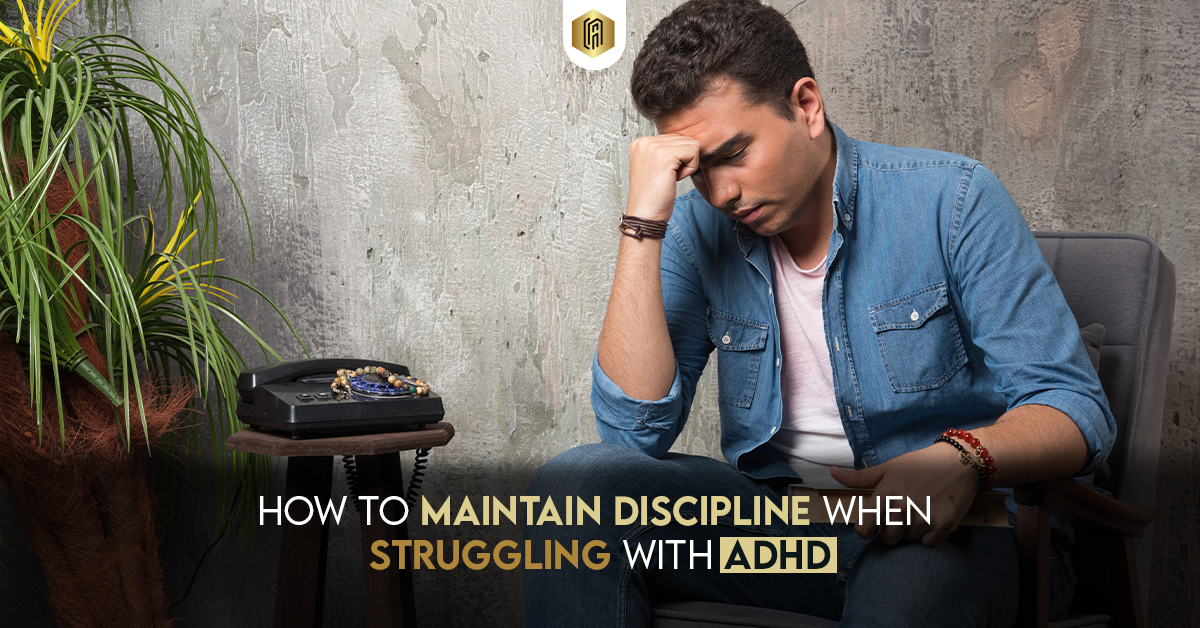ADHD makes discipline hard. Impulsivity and forgetfulness cause frustration.
However, with the right strategies, you can learn how to maintain discipline when struggling with ADHD.
Whether you’re an adult with ADHD or a parent helping a child, building discipline needs patience and consistency.
If ADHD affects your sleep, look for treatment options. Scheduling an appointment with Ascension Psychiatric Services is easy. We offer both in-office and virtual sessions to fit your needs. Contact us today for more information.
Understanding ADHD and Discipline
Attention Deficit Hyperactivity Disorder (ADHD) is a brain activity disorder.
It creates difficulty for individuals to manage their focus, feelings, and actions. This means traditional discipline methods might not always work effectively.
If you or your child struggles with ADHD discipline, focus on building self-control rather than just punishing.
Challenges in Maintaining Discipline with ADHD
-
Impulsivity
Acting without thinking can make it hard to follow rules.
-
Forgetfulness
Important tasks often slip from memory.
-
Hyperactivity
Constant movement makes sitting still a struggle.
-
Emotional Outbursts
Challenges in managing feelings may result in outbursts or irritation.
-
Oppositional Behavior
The challenge to power is frequently confused with intransigence.
-
ADHD Stubbornness
Many children with ADHD show resistance to discipline due to difficulties with impulse control.
-
ADHD Sneaky Behavior
Some children may hide mistakes or lie to avoid consequences, which requires a different approach to discipline.
Recognizing these challenges is the first step in developing effective ADHD discipline techniques that encourage positive behavior rather than punishing symptoms.
The Difference between ADHD and Bad Behavior
ADHD and bad behavior may seem alike, but they are different. ADHD is a brain development issue.
It causes ongoing issues with attention, impulsivity, and hyperactivity. These traits can disrupt daily life. Disciplining a child with ADHD requires understanding.
Their struggles come from brain differences, not from wanting to misbehave. Bad behavior, on the other hand, often has different causes.
It’s usually intentional and can stem from specific situations, upbringing, or emotions. A child with ADHD not listening might genuinely forget instructions or act without thinking.
In contrast, a child showing bad behavior might break rules on purpose for personal gain. Understanding these differences is crucial.
It helps ensure that individuals with ADHD receive appropriate care. This might include behavior therapy, structured support, and sometimes medication.
Traditional discipline methods may not work, leaving potential untapped.
How to Maintain Discipline When Struggling with ADHD?
Here are some strategies to maintain discipline for ADHD:
-
Set Clear Expectations
Establishing clear rules and expectations is crucial. Effortless and consistent rules lead the way. For kids, colorful charts or lists work well.
Adults can use a planner or digital calendar to stay organized. Consistency improves understanding and creates a smooth daily routine.
-
Use Positive Reinforcement
The concept of positive reinforcement depends on the idea of appreciation of good actions to induce their repeated appearance. This is usually better than punishment. For instance:
- Praise a child for completing homework.
- Acknowledge an adult’s effort in meeting a deadline.
- Use reward systems like sticker charts or small incentives.
-
Implement Logical Consequences
Instead of traditional punishment, apply consequences that are directly related to the behavior. For example:
- If a child with ADHD breaks a toy in frustration, they may need to wait before getting a replacement.
- If an adult misses a deadline due to procrastination, they can allocate extra time to catch up.
This approach helps individuals understand the direct impact of their actions without triggering ADHD stubborn responses.
-
Establish Structured Routines
People with ADHD can benefit from a structured environment. A daily routine adds predictability, which can reduce anxiety and enhance time management. The routine should include:
- Set meal, work, exercise, and sleep schedules.
- Break large tasks into smaller, manageable steps.
- Use alarms or reminders for important activities.
-
Utilize Behavioral Therapy
Behavioral therapy is a solid companion in the fight against ADHD. Our skilled therapists help individuals create personalized strategies. These effective strategies improve organization, enhance time management, and control impulses.
-
Practice Mindfulness and Relaxation Techniques
Mindfulness practices like meditation and deep breathing can improve focus and lower impulsivity. Regular practice can enhance self-control and discipline.
-
Seek Professional Support
Getting help from professionals, like therapists or coaches, offers a tailored plan. This plan helps manage ADHD symptoms well. This plan also teaches successfully and helps acquire ADHD discipline techniques.
Cognitive-behavioral therapy (CBT) is one type of psychotherapy. It helps people manage this disorder. CBT teaches coping skills and improves organization.
People with similar problems can build a community. They can share experiences that are helpful and encouraging.
How to Deal with Hyperactive Child at Home?
Raising a hyperactive child takes patience and structure. Try these tips.
- Set a daily schedule for meals, play, study, and sleep.
- Give one instruction at a time.
- Allow outdoor play, sports, or exercises to burn excess energy.
- Provide art, music, or storytelling activities to engage their mind.
- Reduce noise and distractions when the child needs to focus.
- Create a quiet space for homework or relaxation.
- Praise good behavior with words, stickers, or small rewards.
- Ignore minor ADHD sneaky behavior to avoid giving it attention.
- Share deep breathing, mindfulness, or yoga activities.
- Avoid yelling at an ADHD child, utilize a strong yet gentle voice.
Final Thoughts
Learning how to maintain discipline when struggling with ADHD? Requires patience, consistency, and the right strategies.
Discipline is a skill you can develop. This applies whether you’re a parent helping a child or an adult managing ADHD.
Using structure, positive reinforcement, and self-regulation techniques can help people with ADHD stay focused and disciplined.
You can manage ADHD better by understanding challenges. Use tailored strategies and seek support when needed. This way, you create a positive and productive environment.
FAQs
How to deal with angry ADHD child?
Stay calm. Validate their feelings. Use deep breathing or a quiet space to help them self-regulate.
How to calm a hyperactive child?
Offer physical activities, reduce sensory overload, and instruct relaxation techniques.
Can ADHD cause speech delay?
Yes, some children with ADHD with speech delay may struggle with verbal expression due to processing speed issues or difficulty organizing thoughts.






No comment